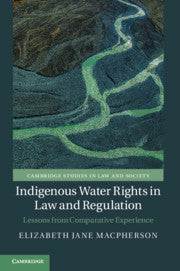Indigenous Water Rights in Law and Regulation : Lessons from Comparative Experience
- Unit price
- / per
-
Author:Elizabeth Jane Macpherson
-
ISBN:9781108460934
-
Publication Date:July 2021
-
Edition:1
-
Pages:311
-
Binding:Paperback
-
Publisher:Cambridge University Press
-
Country of Publication:United Kingdom


A Back Order button means that we don’t have the book in stock at our store. It may already be on order – or we can order it for you from a publisher or distributor at no additional cost.
As we source items from around the globe, a back-order can take anywhere from 5 days to several weeks to arrive, depending on the title.
To check how long this might take, you’re welcome to contact us and we can provide an ETA or any other information you need. We recommend checking the timeframe before committing to an online order.
Indigenous Water Rights in Law and Regulation : Lessons from Comparative Experience
- Unit price
- / per
-
Author:Elizabeth Jane Macpherson
-
ISBN:9781108460934
-
Publication Date:July 2021
-
Edition:1
-
Pages:311
-
Binding:Paperback
-
Publisher:Cambridge University Press
-
Country of Publication:United Kingdom
Description
New Zealand content: Chapter 5. Water rights for Maori in Aotearoa New ZealandThe contentious science of phrenology once promised insight into character and intellect through external 'reading' of the head. In the transforming settler-colonial landscapes of nineteenth-century Australia and Aotearoa New Zealand, popular phrenologists – figures who often hailed from the margins – performed their science of touch and cranial jargon everywhere from mechanics' institutions to public houses. In this compelling work, Alexandra Roginski recounts a history of this everyday practice, exploring how it featured in the fates of people living in, and moving through, the Tasman World. Innovatively drawing on historical newspapers and a network of archives, she traces the careers of a diverse range of popular phrenologists and those they encountered. By analysing the actions at play in scientific episodes through ethnographic, social and cultural history, Roginski considers how this now-discredited science could, in its own day, yield fleeting power and advantage, even against a backdrop of large-scale dispossession and social brittleness.
Adding product to your cart
You may also like
A Back Order button means that we don’t have the book in stock at our store. It may already be on order – or we can order it for you from a publisher or distributor at no additional cost.
As we source items from around the globe, a back-order can take anywhere from 5 days to several weeks to arrive, depending on the title.
To check how long this might take, you’re welcome to contact us and we can provide an ETA or any other information you need. We recommend checking the timeframe before committing to an online order.
You may also like
You may also like
-
New Zealand content: Chapter 5. Water rights for Maori in Aotearoa New ZealandThe contentious science of phrenology once promised insight into character and intellect through external 'reading' of the head. In the transforming settler-colonial landscapes of nineteenth-century Australia and Aotearoa New Zealand, popular phrenologists – figures who often hailed from the margins – performed their science of touch and cranial jargon everywhere from mechanics' institutions to public houses. In this compelling work, Alexandra Roginski recounts a history of this everyday practice, exploring how it featured in the fates of people living in, and moving through, the Tasman World. Innovatively drawing on historical newspapers and a network of archives, she traces the careers of a diverse range of popular phrenologists and those they encountered. By analysing the actions at play in scientific episodes through ethnographic, social and cultural history, Roginski considers how this now-discredited science could, in its own day, yield fleeting power and advantage, even against a backdrop of large-scale dispossession and social brittleness.
-
-
Author: Elizabeth Jane MacphersonISBN: 9781108460934Publication Date: July 2021Edition: 1Pages: 311Binding: PaperbackPublisher: Cambridge University PressCountry of Publication: United Kingdom
New Zealand content: Chapter 5. Water rights for Maori in Aotearoa New ZealandThe contentious science of phrenology once promised insight into character and intellect through external 'reading' of the head. In the transforming settler-colonial landscapes of nineteenth-century Australia and Aotearoa New Zealand, popular phrenologists – figures who often hailed from the margins – performed their science of touch and cranial jargon everywhere from mechanics' institutions to public houses. In this compelling work, Alexandra Roginski recounts a history of this everyday practice, exploring how it featured in the fates of people living in, and moving through, the Tasman World. Innovatively drawing on historical newspapers and a network of archives, she traces the careers of a diverse range of popular phrenologists and those they encountered. By analysing the actions at play in scientific episodes through ethnographic, social and cultural history, Roginski considers how this now-discredited science could, in its own day, yield fleeting power and advantage, even against a backdrop of large-scale dispossession and social brittleness.
-
Author: Elizabeth Jane MacphersonISBN: 9781108460934Publication Date: July 2021Edition: 1Pages: 311Binding: PaperbackPublisher: Cambridge University PressCountry of Publication: United Kingdom
-



